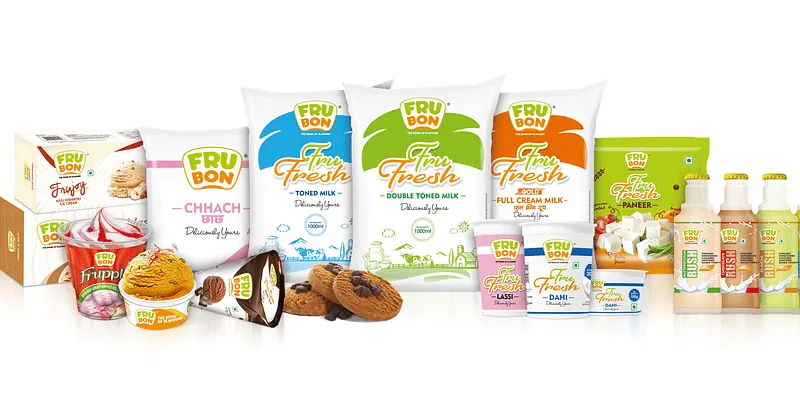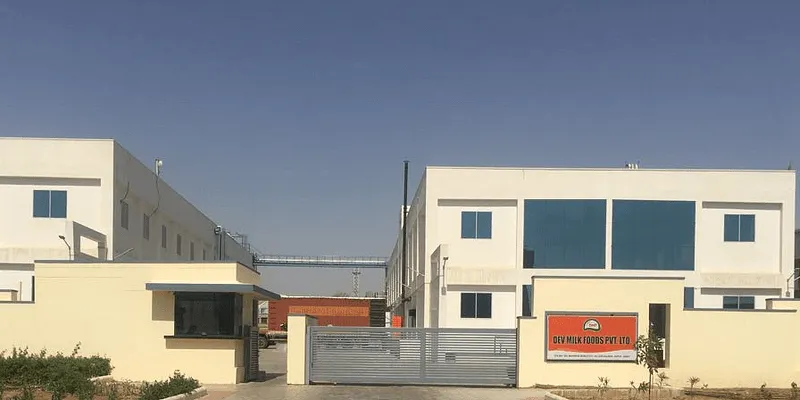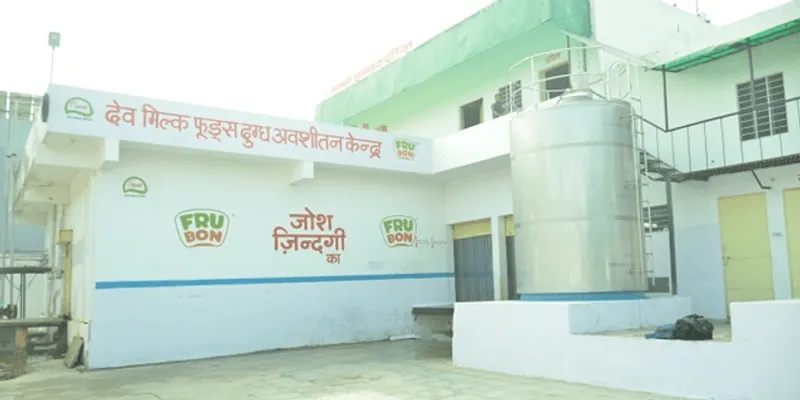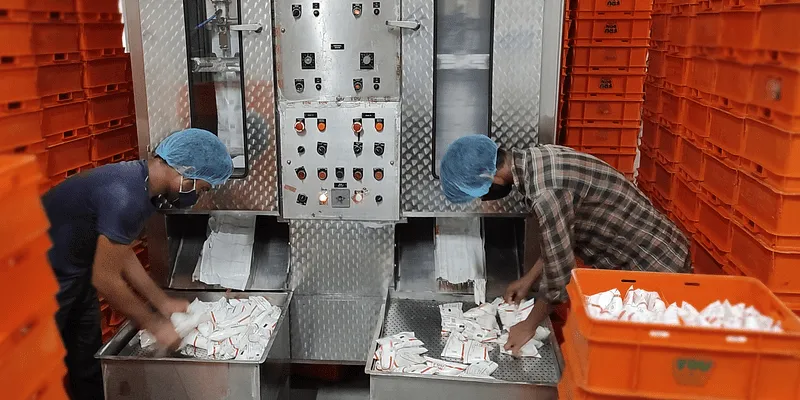Meet the men who built a Rs 36 Cr revenue dairy and ice cream brand out of Rajasthan
Rahul and Rohit Verma quit the corporate sector and teamed up with their father to launch Frubon in 2017 to manufacture and sell dairy products across North India. Today, they run a Rs 36 crore revenue business. Here’s their story.
For over 40 years, DD Verma has been actively involved in the dairy industry. Besides setting up Rajasthan’s first private sector dairy under the name Lotus, Verma worked for state cooperatives as well as a dairy plant and machinery manufacturing company.
So it was only natural that when his sons Rahul and Rohit expressed their interest in working in the dairy industry, they would team up with their father.
“Rohit and I worked in the corporate sector. But, having seen our father work with dairy farmers throughout our childhood, we longed to join this industry. We didn’t think twice before quitting our jobs. In 2017, we started - a dairy and ice cream brand along with our father, ” says Rahul, in an interaction with SMBStory.
Leveraging DD Verma’s extensive experience, network and strong relationships with dairy farmer societies and cooperatives, the bootstrapped business began its journey with its operations in Jaipur and a registered office in Delhi.
In four years, Frubon claims to have scaled up to 250 societies with over 2,500 farmers supplying 20,000 litres of milk per day.
Today, the Vermas retail Frubon products to over 40 North Indian cities and towns through distributors and direct channels such as self-branded ice cream parlours as well as Swiggy, Zomato, Grofers etc. They claim Frubon is now a Rs 36 crore revenue business.

Frubon's range of products
Understanding India’s dairy market
In India, the dairy market is divided into the unorganised sector, where milk is sourced and sold directly by milkmen and vendors; and the organised sector, where cooperatives and private diaries set up channels of procurement and distribution.
Cities, towns and villages across India are serviced largely by state cooperatives such as Rajasthan Cooperative Dairy Federation, Gujarat Co-operative Milk Marketing Federation, cooperative societies such as Amul, private sector dairy enterprises such as Heritage Foods, and more.
“Having worked in the industry since 1975, and having set up a private dairy company, I acquired the technical know-how of running a business in the sector. So in 2015, after I exited Lotus, I joined hands with my sons Rahul and Rohit to start our own dairy brand,” says DD Verma, who is the Founder and MD of Frubon.
The trio invested their personal savings to launch Dev Milk Foods, under which, the brand Frubon was formed. It currently retails milk, ice cream, curd, paneer and other value added dairy products, but positions itself largely as an ice cream brand.

Frubon's manufacturing unit in Jaipur
End-to-end control of supply chain and manufacturing
Rahul, who is Co-founder and Director at the family business, says Frubon’s core strength is its high degree of control over its supply chain and manufacturing.
“As our focus is on high quality products, the only way to ensure it is by having end-to-end control of processes. Procurement of milk is fundamental, and we get it directly from our network of farmers at three collection centres in Ringas, Bindayaka and Newai in Rajasthan,” he says.
Farmer families - with whom DD Verma built strong relationships and goodwill over the decades - bring cans of milk to the centres, where the milk is tested for over 35 parameters of quality.
The milk is brought to the centres every morning, and once tested, it is transported in tankers to Frubon’s facility in Mahindra World City the same day.
For Frubon’s fresh milk packs, Rohit, who also holds the title of Co-founder and Director, says the milk is processed and dispatched the same night to distributors. “By the next morning, milk packets are at the homes of our customers, all in a span of 24 hours from the time of collection,” he says.
For Frubon’s value added dairy products such as ice cream, paneer, etc, the time taken to reach customers is not as predictable since these SKUs don’t sell out in just one day like fresh milk does, explains Rohit.
“The raw material for ice cream still reaches us in 12 hours, but in retail, it takes longer to leave the shelves,” he adds.
Besides their strong relationship with farmers, the Vermas are also proud of their owned manufacturing facility in Jaipur.
“We have an experienced team of dairy professionals working with us at the 7,000 square metre plant, which has a full set up for ice cream and dairy products. In Rajasthan, we are the only brand to have this kind of owned setup,” claims Rahul.

Frubon's collection centre at Bindayaka
Frubon’s competitive landscape
According to Rahul, “Even reputable brands don’t own a facility in Rajasthan, and may prefer to outsource production to a third party. So the advantage we get is we can quickly supply our products from Jaipur to markets in Rajasthan, Delhi, Madhya Pradesh etc with relatively fewer number of touchpoints.”
The founders name the likes of Creambell, Vadilal and other brands as competitors in the ice cream market, whereas Mother Dairy, Amul etc are competitors in fresh milk and value added dairy products.
With a wide range of such private, cooperative and government-owned players, the dairy market in India is worth Rs 11.35 lakh crore.
But, Frubon’s founders believe it is not easy for other players to replicate its operating model.
“There are brands which don’t procure milk directly. There are also some new ones which don’t do manufacturing themselves, and instead, only put their brand name on finished products made by third parties. It is also not an easy feat to build a strong network of farmers and invest in a manufacturing facility like we have,” Rahul adds.
Along the way, the Vermas have invested a significant amount of time, money and effort in R&D and product development. Rohit claims the challenge of running such a business is in being innovative in launching new products - each of which require multiple iterations and tweaks.
“We have over 140 SKUs in just the ice cream category, and it has not been easy to build this product portfolio. For instance, consumers in Gujarat have a palate for sweeter flavours, while in Rajasthan, they prefer a balanced taste. So we have to tweak our products as per specific market needs. This holds good for all new products across curd, paneer and others,” he explains.

Fresh milk packs being packed at Frubon
COVID-19 impact and the road ahead
When the COVID-19 pandemic hit India and resulted in nationwide lockdowns, Frubon saw demand from restaurants and retail shops dissipate. But it couldn’t stop acquiring milk as the cattle owned by dairy farmers continued producing milk.
“We tackled this supply-demand mismatch by selling excess milk to other players like Mother Dairy, which had the capability to convert it into skim milk and solving their own supply-demand problems,” Rahul says.
While the company did not manage to grow like it did year-on-year since inception, revenues did not fall, the founders claim. They say in FY20 and FY21, the business saw around Rs 36 crore revenue each year.
Going forward, as Frubon looks to expand its presence across states, it is looking to increase its topline. But the Vermas believe it may not take significant investment. According to them, their current manufacturing capabilities are underutilised even in its existing product portfolio.
“Without much further investments, we aim to utilise more of our existing production, and reach Rs 200 crore revenue soon,” Rahul says.
YourStory’s flagship startup-tech and leadership conference will return virtually for its 13th edition on October 25-30, 2021. Sign up for updates on TechSparks or to express your interest in partnerships and speaker opportunities here.
For more on TechSparks 2021, click here.
Applications are now open for Tech30 2021, a list of 30 most promising tech startups from India. Apply or nominate an early-stage startup to become a Tech30 2021 startup here.
Edited by Anju Narayanan











